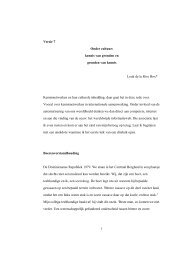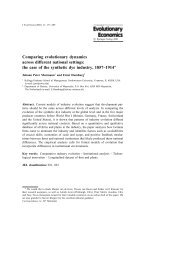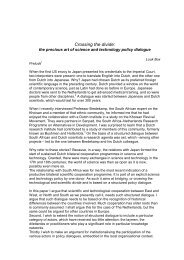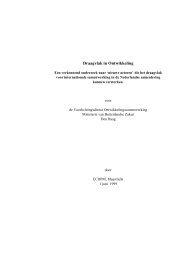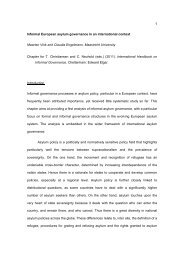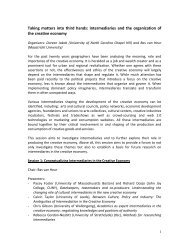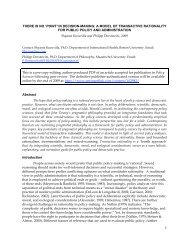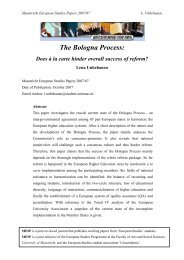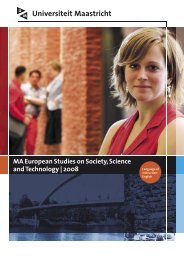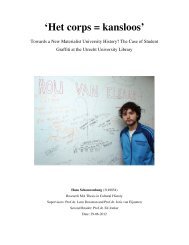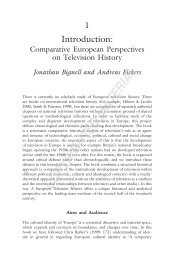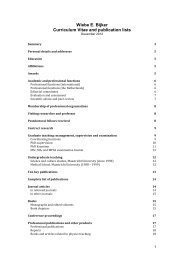Winds of Change: The Europeanization of National Foreign Policy
Winds of Change: The Europeanization of National Foreign Policy
Winds of Change: The Europeanization of National Foreign Policy
Create successful ePaper yourself
Turn your PDF publications into a flip-book with our unique Google optimized e-Paper software.
Maastricht European Studies Papers 2007/01 Bennet Strang<br />
forbidden to supranational influences (Sjursen, 2003). <strong>The</strong> associated state-centric school 10 ,<br />
thus, favours the traditional realist and intergovernmental approach with states being<br />
sovereign key actors, putting a premium on self-interest and utility maximization (Wong,<br />
2005). <strong>The</strong> European idealist school 11 , in contrast, also allows for non-state actors to play a<br />
role in foreign policy. Nonetheless, it does not fail to acknowledge that states’ foreign policies<br />
are important though, allegedly, being gradually replaced by a common European approach<br />
(ibid.).<br />
<strong>The</strong> theoretical assumptions <strong>of</strong> the state-centric school appear to be outdated, against<br />
the background <strong>of</strong> the incrementally developing European venue <strong>of</strong> foreign policy making. As<br />
“…studying foreign policy in an EU context has its particular intricacies” (Mahncke, 2004, p.<br />
27), since multiple non-state actors are involved in a multilevel foreign policy game 12<br />
(Sjursen, 2003), one “…must at least reflect on the possibility that the very fundament <strong>of</strong><br />
national foreign policy is changing” (Sjursen, 1999; Biersteker, 2002). Understandably,<br />
European states have jealously tried to maintain full foreign policy autonomy (Smith, 2003),<br />
although they could not forestall that<br />
“‘…the conduct <strong>of</strong> foreign policy [has been moved] away from the old nation-state<br />
sovereignty model towards a collective endeavour, a form <strong>of</strong> high-level networking<br />
with transformationalist effects and even more potential’ [own emphasis]” 13 .<br />
<strong>The</strong> prospect <strong>of</strong> an increased foreign policy ‘potential’, i.e. greater impact, which derives from<br />
a concerted European position on foreign policy matters, is a key motivation to cooperate in<br />
this sensitive area in the first place 14 .<br />
10 In accordance with this school, traditional foreign policy analysis is applicable and maintains that<br />
the member states remain the key actors (Manners/ Whitman, 2000).<br />
11 To this school, transformational foreign policy analysis is attributable, which holds that the conduct<br />
<strong>of</strong> foreign policy gradually slips into the hands <strong>of</strong> supranational actors, who thereby increasingly play<br />
into this key sovereignty domain <strong>of</strong> the nation-state (Manners/ Whitman, 2000).<br />
12 In this context, “…EU membership involves asking some difficult questions <strong>of</strong> foreign policy<br />
practices…” (Manners/ Whitman, 2000, p. 264), as for example the one about the influence <strong>of</strong> the<br />
European Commission on foreign policy-making under first pillar prerogatives, cross-pillar conflicts<br />
and delimitations <strong>of</strong> influence in external matters and eventual rival claims to external representation<br />
in Brussels by the German Länder.<br />
13 (Hill quoted in Wong, 2005, p. 138)<br />
14 This also relates to the motivation <strong>of</strong> small member states to amplify their voice by siding with<br />
bigger ones. Moreover, there is <strong>of</strong> course a certain conflict <strong>of</strong> interest observable, characterized on the<br />
one hand by the “…drive to act collectively on the world stage and the desire to retain national<br />
autonomy…” (Smith, 2003, p. 230), on the other. It seems appropriate to suggest that “…the Member<br />
States conduct all but the most limited foreign policies objectives inside an EU context” (Manners/<br />
Whitman, 2000, p. 243). <strong>The</strong> “[t]he value <strong>of</strong> Political Cooperation to member governments has thus to<br />
be established and re-established as new issues and crises arise” (Wallace quoted in Hill, 1983, p. 8).<br />
6



